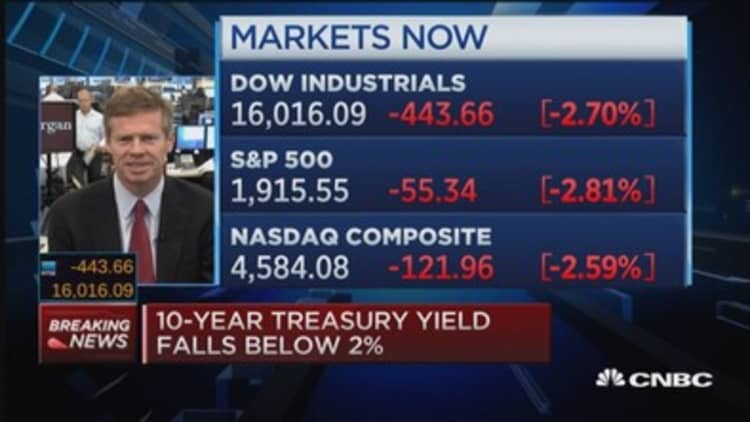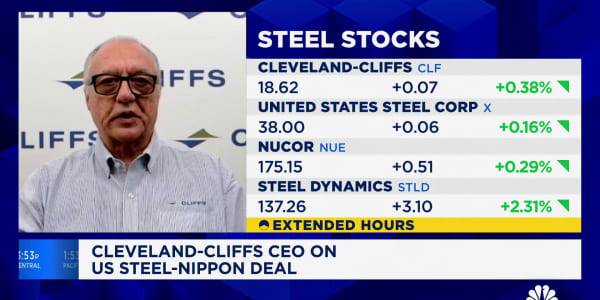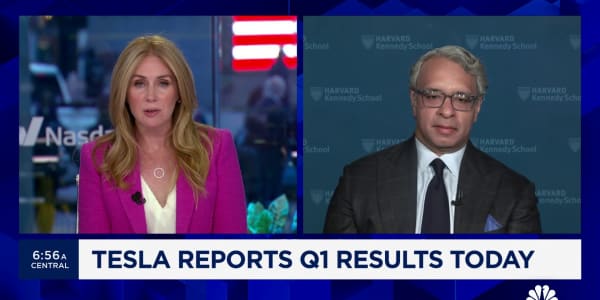
Market chatter about what the Federal Reserve's next steps will be suddenly has shifted from when it will raise rates to when it will offer more stimulus.
Mind you, no one believes the U.S. central bank is about to start printing money again anytime soon. However, there is talk that faced with a slowing global economy and a domestic market dependent on cheap debt, it's only a matter of time before the spigots get turned on once more.
"The Fed is not going to raise rates. They are at zero forever," said Peter Schiff, head of Euro Pacific Capital and one of the most well-known and impassioned of all the Wall Street Fed critics. "The Fed is not done with QE, they're just getting started. The Fed is doing QE4, QE5. This is a never-ending process."
The "QE" reference, of course, is to quantitative easing, the bond-buying program that added about $3.7 trillion to the Fed's now-$4.5 trillion balance sheet since late 2008. Three rounds of QE, plus the balance sheet-neutral Operation Twist, have helped boost the stock market dramatically, with the rising more than 190 percent off the March 2009 lows. But the impact on the real economy has been less tangible.
In addition to the previous rounds of QE, the Fed has kept its key interest rate near zero, holding down lending rates and keeping borrowing costs low for the $8 trillion in debt the government has added since the financial crisis.
With no room to take rates lower, markets in near-free fall and worries building over a global recession, another round of easing would be the only monetary policy option left.
Read MoreThe Fed rate hike speculation is getting crazy
"I don't believe they're ever going to raise rates, because they can't do it," Schiff said. "People actually believe in the legitimacy of the U.S. recovery, they believe in the Fed's rhetoric. The truth is, everything has gotten worse. All the Fed did was blow a bigger bubble. All they did was interrupt the financial crisis."
While unlikely to take any specific action in the near term, Fed officials could start leaving a trail of clues in upcoming public speeches. No time would be better, for instance, than the Aug. 27-29 retreat at Jackson Hole, Wyoming, the very site where then-Fed Chairman Ben Bernanke planted the seeds for QE2 back in 2010.
"It's not about QE happening. If the perception of QE (happening) goes from zero to 18 percent, that's a huge impact," said Lawrence McDonald, head of U.S. macro strategy at Societe Generale. "Maybe even have one Fed governor, the most dovish of the doves, like (Minneapolis Fed President Narayana) Kocherlakota ... lay it out there. If one of them does it, look out."
For now, the market's deliberations have focused on the timing of rate hikes, and the current verdict is that the first one since June 29, 2006, won't happen until January 2016. The CME's FedWatch indicator shows just a 24 percent chance of a move in September and a 49 percent chance in December.
Read MoreFed may have just gotten a red light for rate hike
Economist Michael Pento, founder of Pento Portfolio Strategies and a frequent Fed critic, said the central bank has work to do before it could take viable steps toward another round of QE.
"For the Fed to go back to QE, there are two problems: First, they'd have to admit that everything they've done since 2008 has been a complete failure," Pento said. "Then, you have the problem that QE doesn't really affect fundamentals in the economy, it only affects asset prices."
Indeed, a recent paper by Stephen D. Williamson, St. Louis Fed vice president, said there was no evidence that QE provided the economic help that its supporters touted.
Read More'Forward guidance' didn't work, either
Also, similar easing programs haven't done much elsewhere in the world. Japan's aggressive QE couldn't prevent a 0.4 percent contraction in second-quarter growth, while the euro zone is barely above water despite its own efforts, with just a 0.3 percent improvement in gross domestic product for the same period.
"Sixty trillion dollars in debt and seven years of ZIRP later, anyone who thought this was going to be a smooth and easy transition to escape velocity is getting a rude awakening," Pento said. "That fantasy is shattering."






